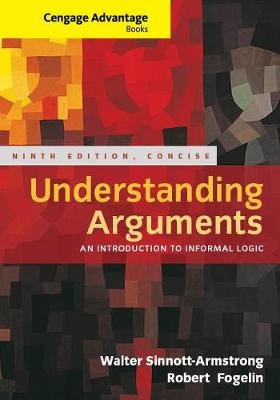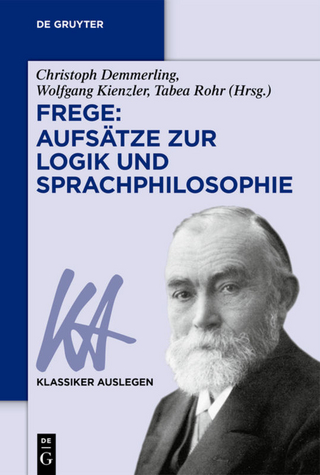
Cengage Advantage Books: Understanding Arguments, Concise Edition
Wadsworth Publishing Co Inc (Verlag)
978-1-285-19739-5 (ISBN)
CENGAGE ADVANTAGE BOOKS: UNDERSTANDING ARGUMENTS, CONCISE EDITION, 1E uses everyday life experiences to teach the basics of informal logic. By taking out the non-essential instruction, this edition hones in on the "argument construction" involved in day-to-day life, and how to do it better. Plus, to round out the discussion, CENGAGE ADVANTAGE BOOKS: UNDERSTANDING ARGUMENTS, CONCISE EDITION, 1E includes a three-chapter overview of formal logic as well.
Walter Sinnott-Armstrong is Chauncey Stillman Professor of Practical Ethics in the Department of Philosophy and the Kenan Institute for Ethics at Duke University. Robert J. Fogelin is Professor of Philosophy and Sherman Fairchild Professor in the Humanities at Dartmouth College.
Preface.
PART I: HOW TO ANALYZE ARGUMENTS.
1. Uses of Arguments.
What Arguments Are. Justifications. Explanations. Combinations: An Example.
2. The Web of Language.
Language and Convention. Linguistic Acts. Speech Acts. Performatives. Kinds of Speech Acts. Conversational Acts. Conversational Rules. Conversational Implication. Rhetorical Devices. Summary.
3. The Language of Argument.
Argument Markers. If . . . , then. Arguments in Standard Form. A Problem and Some Solutions. Assuring. Guarding. Discounting. Evaluative Language.
4. The Art of Close Analysis.
An Extended Example. Clerk Hire Allowance, House of Representatives.
Chapter 5. Deep Analysis.
Getting Down to Basics. Clarifying Crucial Terms. Dissecting the Argument. Arranging Subarguments. Some Standards for Evaluating Arguments. Validity. Truth. Soundness. Suppressed Premises. Contingent Facts. Linguistic Principles. Evaluative Suppressed Premises. Uses and Abuses of Suppressed Premises. The Method of Reconstruction. An Example of Reconstruction: Capital Punishment.
PART II: HOW TO EVALUATE ARGUMENTS: DEDUCTIVE STANDARDS.
6. Propositional Logic.
The Formal Analysis of Arguments. Basic Propositional Connectives. Conjunction. Disjunction. Negation. Process of Elimination. How Truth-Functional Connectives Work. Testing for Validity. Some Further Connectives. Conditionals. Truth Tables for Conditionals. Logical Language and Everyday Language. Other Conditionals in Ordinary Language.
7. Categorical Logic.
Beyond Propositional Logic. Categorical Propositions. The Four Basic Categorical Forms. Translation into the Basic Categorical Forms. Contradictories. Existential Commitment. Validity for Categorical Arguments. Categorical Immediate Inferences. The Theory of the Syllogism.
PART III: HOW TO EVALUATE ARGUMENTS: INDUCTIVE STANDARDS.
8. Arguments To and From Generalizations.
Induction versus Deduction. Statistical Generalizations. Should We Accept the Premises? Is the Sample Large Enough? Is the Sample Biased? Is the Sampling Procedure Biased? Statistical Applications.
9. Inference to the Best Explanation and from Analogy.
Inferences to the Best Explanation. Which Explanation is Best? Context is Crucial. Arguments from Analogy. Are Analogies Explanations?
10. Causal Reasoning.
Reasoning About Causes. Sufficient Conditions and Necessary Conditions. The Sufficient Condition Test. The Necessary Condition Test. The Joint Test. Rigorous Testing. Reaching Positive Conclusions. Applying These Methods to Find Causes. Normality. Background Assumptions. A Detailed Example. Concomitant Variation.
11. Chances.
Some Fallacies of Probability. The Gambler's Fallacy. Heuristics. The Language of Probability. A Priori Probability. Some Rules of Probability. Probabilities of Negations. Probabilities of Conjunctions. Probabilities of Disjunctions. Probabilities in a Series. Probabilities of Negations. Probabilities of Conjunctions. Probabilities of Disjunctions. Permutations and Combinations. Bayes's Theorem.
12. Choices.
Expected Monetary Value. Expected Overall Value. Decisions Under Ignorance.
PART: IV: FALLACIES.
13. Fallacies of Vagueness.
Uses of Unclarity. Vagueness. Heaps. Slippery Slopes. Conceptual Slippery-Slope Arguments. Fairness Slippery-Slope Arguments. Causal Slippery-Slope Arguments.
14. Fallacies of Ambiguity.
Ambiguity. Equivocation. Definitions.
15. Fallacies of Relevance.
Relevance. Ad Hominem Arguments. Inconsistency. Genetic Fallacies. Appeals to Authority. More Fallacies of Relevance. Appeals to Popular Opinion. Appeals to Emotion.
16. Fallacies of Vacuity.
Circularity. Begging the Question. Self-Sealers.
17. Refutation.
What Is Refutation? Counterexamples. Reductio Ad Absurdum. Straw Men and False Dichotomies. Refutation by Parallel Reasoning.
Credits.
Index.
| Erscheint lt. Verlag | 7.6.2024 |
|---|---|
| Verlagsort | Belmont, CA |
| Sprache | englisch |
| Maße | 165 x 234 mm |
| Gewicht | 485 g |
| Themenwelt | Geisteswissenschaften ► Philosophie ► Logik |
| ISBN-10 | 1-285-19739-9 / 1285197399 |
| ISBN-13 | 978-1-285-19739-5 / 9781285197395 |
| Zustand | Neuware |
| Haben Sie eine Frage zum Produkt? |
aus dem Bereich


